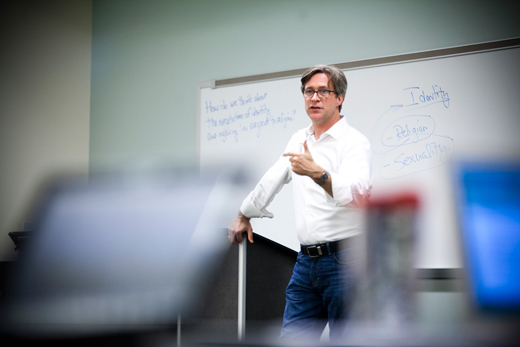This spring's University Course selections will expand to four offerings, covering topics that include modern health care, the history of U.S. welfare policies, cross-cultural communication, and global perspectives on neglected diseases and drug development.
Now in its fourth year, the University Course brings together students — undergraduate, graduate and professional — and faculty from across campus to explore an issue of common concern.
This semester's courses will also offer learning opportunities that extend into the larger University and metro Atlanta communities.
"It's a different kind of intellectual community — one that introduces undergraduates to a broader university than they might normally be exposed to," says Donna Troka, associate director of the Center for Faculty Development and Excellence, which coordinates and oversees the University Course.
The University Courses for spring 2014 are:
"Sick: Healthcare in the Modern Era," with co-conveners Jaffar Khan and Pearce Korb, associate professors of neurology. Why are health care bills so high? Who actually pays them? Who should have health care? What direction should reform take? This course offers a multidisciplinary examination of many aspects of the current health care system, including its historical context and complexity, how it has evolved, and its overall magnitude, touching on some of modern health care's most hotly contested debates. Though there will be an emphasis on health care delivery in the United States, international outreach and comparative health care will also be addressed.
"The War on Poverty and its Legacy: Assessing 50 Years of Social Policy in America," led by Michael Rich, associate professor of political science. This course is tied to the 50th anniversary of President Lyndon B. Johnson's call for a "War on Poverty," which ushered in a host of federal programs targeted to America's poor. It offers a comprehensive, multi-disciplinary look at poverty in America, examining its people and politics, as well as public policies and their effects on reducing or eliminating poverty. Coursework will connect to the greater Atlanta area, drawing on residents, community leaders, nonprofit executives, and government officials as occasional speakers, panelists and site hosts.
"Translating 'America,' Translating 'The Other': Cross-cultural (Mis)communications in an Age of Globalization," led by Karen Stolley, professor of Spanish. During a decade of global financial crisis and conflict, many in the U.S. have sought to understand the nation's position in the world either through re-affirmation of American exceptionalism or a discourse of decline, articulating a global narrative with the U.S. at its center. How do Americans imagine the U.S. and themselves? How do they imagine "others" in the world, and how do others see us? This course investigates the differences, with a focus on the Islamic world, Latin America and Europe and a concentration on topics of empire and power, gender and sexuality, and consumer culture and global economy. The course is tied to a co-curricular campus film festival.
"The Commercial Neglect of Treatable Disease: A Global Health Perspective on Neglected Disease and Drug Development," with conveners Michael Sacks, associate professor of organization and management, and Meredith Schwartz, managing director of the Emory Institute of Drug Development. The state of commercially neglected diseases is explored within the context of global health to gain perspective on the roles played by the pharmaceutical industry, universities and scientists in addressing the medical needs of the developing world, including ethical challenges faced by each entity. The course introduces fundamentals in an expansive field, challenging students to think across disciplines to find broad-based solutions to critical problems.

